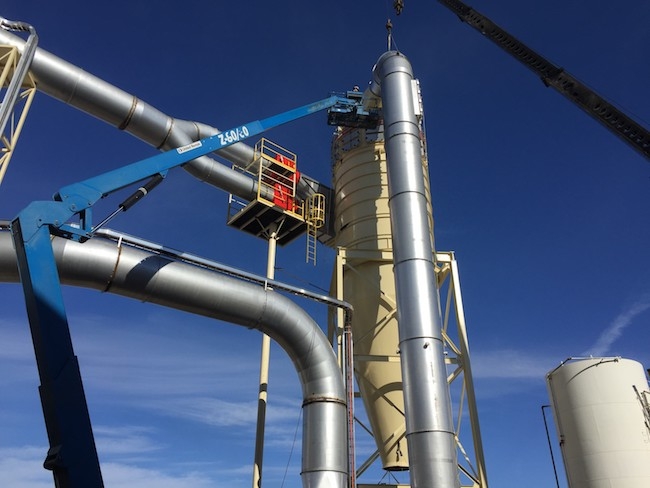
6 questions to ask when choosing a dust collection system contractor
June 20, 2018
By Erin Rayner
June 21, 2018 - A dust collection system is an integral part of a facility and needs to be maintained and updated properly. The knowledge of the team in charge of keeping this vital system in tip top shape is also critical. This is especially because, as per NFPA 664, the owner has a responsibility to ensure that the facility and the combustible dust system are designed, installed and maintained properly.

Often it isn’t just one person in charge of ensuring the health of the dust collection system, it is a team of internal staff and external contractors. Making sure staff are current on the regulations is challenging in itself, but how do they know they’re hiring a knowledgeable, qualified contractor?
[This article is part of our 2018 Dust Safety Week coverage. Find more articles here.]
There are all different levels of knowledge when looking for a contractor to design, service or maintain a dust collection system. Here are six questions to ask before you sign on the dotted line:
1. Does the contractor have trained staff?
Unfortunately, at this time there isn’t a standardized training certificate for dust collection systems. However, there are still a few ways you can tell how serious the contractor is about their training and knowledge. Start by asking the general question: “What training do you or your team have on dust collection systems of this type and the NFPA codes that apply?” A blank stare or the response, “We’ve been doing this for years without incident,” is an indication that the contractor may need further training. There are courses available for staff and sub-contractors, for example, the NFPA Dust Compliance Inspection offered by Dalhousie University, or Fundamentals in Industrial Ventilation from the Association Advancing Occupational and Environmental Health (ACGIH). Of course, the dust specific courses should follow a qualified and certified trades program.
2. Is the contractor knowledgeable about your system and process?
Now that you know the training level of your staff and contractor, it’s important to ensure that the contractor understands the characteristics of the dust in your facility. What type of dust is it? Is the dust explosive? In order to design, evaluate or service a dust collection system adequately, it is essential that a sample of the dust is tested in a lab for explosivity content. Having a thorough understanding of the material the system is handling better allows staff and contractors to effectively manage any issues they may find. Another way to ensure a contractor knows your specific system is to observe whether or not the contractor takes the time to investigate air flow, equipment locations, power consumption, present and future needs of the system and its lifecycle. All of these questions are integral to coming up with the best solution for your needs.
3. Does the contractor have awareness and understanding of NFPA requirements and related building codes?
Regulations, codes and standards can be a frustrating, but very necessary set of tools to have in your dust collection toolbox. A qualified contractor will have someone on the team who is well-versed and up to date on the changing regulations. Staying up to date is also important for the staff as NFPA standards are reviewed and a new edition is published every three to five years. New technologies and production methods are always evolving causing the regulations to adapt. Training for both staff and contractors in relevant codes is a key factor to allow the contractor to be up to date with the latest changes and the facility’s staff to be able to ask the contractor knowledgeable questions.
4. Does the contractor have a safety culture and positive safety record?
This may seem obvious to some, but it wouldn’t be a complete list if we didn’t include a note to ask for the contractor’s safety credentials. Certain organizations to look for include: COR, ISO, WBC, ISN, ComplyWorks, CanQual, Avetta, SMACNA, and being a member of the NFPA.
5. Does the contractor have industry experience?
A great way to gauge a company’s experience in the industry is to ask for references and a list of past projects. NFPA requirements can be vastly different for large and small systems. You can request proof of experience of completed similar projects, and follow up with references to see whether the contractor is in good standing with their previous clients. Keep in mind that no one, when asked for a reference, will give the name of a difficult job or one that didn’t go well, so be sure to ask references about how the contractor handled difficult situations when they came up.
6. Is there a warranty/ guarantee?
Working to keep the system NFPA compliant should always be priority. A reputable dust collection contractor will provide you with a guarantee on the emissions or reduction in explosive dust if all their recommendations are put in place and the system is used and maintained as directed. They may also provide third-party emissions testing to verify the results and the improvements to your facility.
Ignorance is not bliss when working with explosive dust and safety of staff, and facility needs to remain top of mind. By using these six questions as your guide, you’re well equipped to choose the right contractor to assist with your dust collection system needs.
Erin Rayner is marketing and business development manager for VETS Group. www.vetsgroup.com @VETSsince1921
Print this page